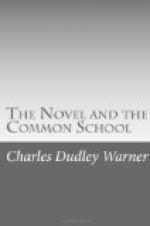But the reading need not be confined to the classics nor to the master-pieces of literature. Natural history—generally the most fascinating of subjects—can be taught; interest in flowers and trees and birds and the habits of animals can be awakened by reading the essays of literary men on these topics as they never can be by the dry text-books. The point I wish to make is that real literature for the young, literature which is almost absolutely neglected in the public schools, except in a scrappy way as a reading exercise, is the best open door to the development of the mind and to knowledge of all sorts. The unfolding of a Greek myth leads directly to art, to love of beauty, to knowledge of history, to an understanding of ourselves. But whatever the beginning is, whether a classic myth, a Homeric epic, a play of Sophocles, the story of the life and death of Socrates, a mediaeval legend, or any genuine piece of literature from the time of Virgil down to our own, it may not so much matter (except that it is better to begin with the ancients in order to gain a proper perspective) whatever the beginning is, it should be the best literature. The best is not too good for the youngest child. Simplicity, which commonly characterizes greatness, is of course essential. But never was a greater mistake made than in thinking that a youthful mind needs watering with the slops ordinarily fed to it. Even children in the kindergarten are eager for Whittier’s “Barefoot Boy” and Longfellow’s “Hiawatha.” It requires, I repeat, little more pains to create a good taste in reading than a bad taste.
It would seem that in the complete organization of the public schools all education of the pupil is turned over to them as it was not formerly, and it is possible that in the stress of text-book education there is no time for reading at home. The competent teachers contend not merely with the difficulty of the lack of books and the deficiencies of those in use, but with the more serious difficulty of the erroneous ideas of the function of text-books. They will cease to be a commercial commodity of so much value as now when teachers teach. If it is true that there is no time for reading at home, we can account for the deplorable lack of taste in the great mass of the reading public educated at the common schools; and we can see exactly what the remedy should be—namely, the teaching of the literature at the beginning of school life, and following it up broadly and intelligently during the whole school period. It will not crowd out anything else, because it underlies everything. After many years of perversion and neglect, to take up the study of literature in a comprehensive text-book, as if it were to be learned—like arithmetic, is a ludicrous proceeding. This, is not teaching literature nor giving the scholar a love of good reading. It is merely stuffing the mind with names and dates, which are not seen to have any relation to present life, and which speedily fade out of the mind. The love of literature is not to be attained in this way, nor in any way except by reading the best literature.




